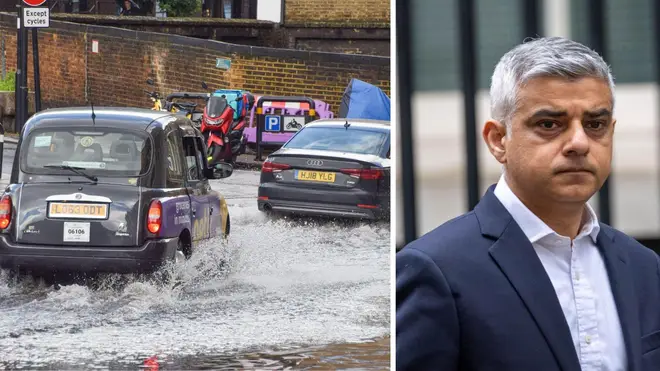
Nick Ferrari 7am - 10am
12 August 2022, 17:30

The Mayor of London has said he is ‘seriously concerned’ about the possibility of severe flash flooding in the city, which was officially declared to be in a drought today.
Some areas of the capital have experienced a month without rain, drying out the ground.
But rain is forecast for the capital next week, and dry ground absorbs water more slowly, leading to fears of flash flooding.
Sadiq Khan voiced his concern about a repeat of the scenes in London last July, in which flash floods damaged thousands of homes and the city’s transport network.
Speaking to the Local Democracy Reporting Service, Mr Khan said: “We are coordinating with councils what we’d do if that [flooding] was to happen.
“But let’s be frank, a city like London is not ready for the consequences of climate change and we’ve got to get ready.”
In this experiment Dr Rob Thompson of @UniRdg_Met shows just how long it takes water to soak into parched ground, illustrating why heavy rainfall after a #drought can be dangerous and might lead to flashfloods. @R0b1et @UniRdg_water pic.twitter.com/zbb3xLTXdK
— Uni of Reading (@UniofReading) August 10, 2022
In December, a senior Thames Water employee claimed that sewers saw a month’s worth of rain in just one hour during a storm on July 12th 2021.
Pictures and video footage from the floods showed cars submerged in water and storm drains back flowing into the streets.
Climate change is causing an increase in extreme weather events in the UK.
Rising temperatures are leading to more frequent, intense heatwaves, while a greater amount of moisture in the warming atmosphere is causing more severe storms and flooding.
Read more: Tube, train and bus strike dates: When are the walkouts set to cripple UK in August
Thames Water is currently constructing a 7.2 metre wide super sewer beneath the Thames, as part of efforts to increase London’s drainage capacity.
Currently, during heavy rainfall, London’s drains release sewage straight into the river Thames as they become unable to cope with the volume of water entering the system.